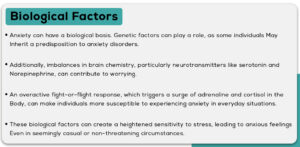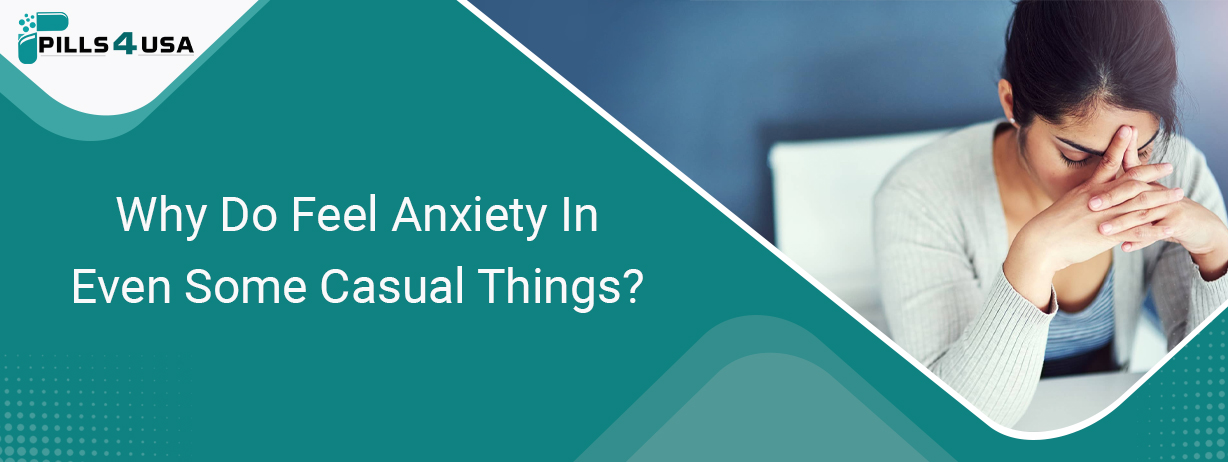📝Introduction
Anxiety is a complex and multifaceted emotional response that can occur in various situations and impact individuals differently. Worrying is commonly associated with stressful situations or significant life events, but it can also arise in seemingly casual or everyday situations.
The situations may include social interactions, minor decisions, or routine activities that others perceive as ordinary and unthreatening. Understanding why individuals feel anxiety in these seemingly inconsequential situations requires exploring different factors that contribute to this experience.
Anxiety in everyday scenarios can stem from a combination of biological, psychological, and environmental factors. Biological factors, such as genetic predispositions and imbalances in brain chemistry, can make individuals more susceptible to worrying.
Past traumatic experiences, including accidents, abuse, or significant losses, can leave lasting imprints on one’s mental and emotional well-being, causing worrying to surface even in seemingly harmless situations that trigger memories.
Past trauma associations. For short-term relief, some people take antidepressant drugs such as Zopisign 10 Zopiclone. Worrying is largely influenced by learned behaviors. If individuals grew up in an environment where concern was prevalent or witnessed anxious responses from family members, they may adopt similar patterns of anxious behavior.
Cognitive factors, such as negative thinking patterns and irrational beliefs, can amplify worrying in everyday situations. Environmental stressors, such as work pressures or relationship difficulties, can contribute to heightened stress levels and increased vulnerability to anxiety.
By exploring these factors, individuals can gain insight into why they may experience anxiety in everyday situations. Recognizing these underlying causes can empower individuals to seek appropriate support, develop coping strategies, and explore therapeutic interventions to manage worrying effectively.
It is essential to remember that reaching out to mental health professionals can provide valuable guidance and support in navigating these challenges and improving overall well-being. Sometimes they can prescribe medications like Zopifresh to some individuals.
Also Read: Anxiety and Stress in Relation to Insomnia

🎗Past Traumatic Experiences
A person’s mental and emotional well-being can be adversely affected by past traumatic experiences. These experiences can create a state of hyperarousal or heightened vigilance, making individuals more prone to anxiety.
In some cases, even casual situations may trigger memories or associations with past trauma, causing worry to surface. Some tend to consume allopathic pills like Zopifresh 7.5 mg to calm such attacks.
💠Learned Behaviors
Anxiety can develop as a learned behavior. If individuals grew up in an environment where worrying was prevalent or witnessed anxious responses from family members or caregivers, they may adopt similar coping mechanisms.
These learned behaviors can become ingrained over time, causing individuals to automatically respond with anxiety in everyday situations.
The association between worrying and certain stimuli or circumstances may persist even if the actual threat level is minimal.
Also Read: How do sleeping pills help with insomnia and anxiety in older people?
⚕️Cognitive Factors
Cognitive factors play a significant role in anxiety. Negative thinking patterns and irrational beliefs can contribute to worrying in casual situations. Catastrophic thinking, where individuals imagine the worst-case scenarios, can magnify perceived risks and potential negative outcomes.
Overgeneralization, where individuals draw broad negative conclusions based on limited experiences, can also heighten anxiety.
Excessive worry, often fueled by distorted thinking, can lead individuals to anticipate and fear negative outcomes even in minor events or interactions. You can get more guidance from online resources like Pills4usa.com for the same.
💆🏻Environmental Stressors
Environmental stressors can impact an individual’s overall stress levels, making them more susceptible to worrying in everyday situations. Work pressures, financial concerns, relationship difficulties, or other external stressors can accumulate and lower an individual’s resilience.
When individuals are already under significant stress, they may be more reactive to triggers that may not typically cause anxiety. The cumulative effect of stressors can make individuals more sensitive to even minor events, leading to heightened anxiety responses.
Also Read: Your intimate life shouldn’t be ruined by Anxiety
➰Perfectionism And High Expectations
Individuals with perfectionistic tendencies or high self-imposed expectations may experience anxiety in casual situations.
The fear of making mistakes, being judged, or not meeting their high standards can generate worry. Perfectionists may constantly need to control outcomes and fear any deviation from their expectations.
As a result, even seemingly insignificant events or interactions can trigger anxiety and can lead to forming medicinal habits including zopiclone (an antidepressant medicine).
⚙Lack Of Coping Mechanisms
Effective coping mechanisms and stress management skills are essential for managing worrying. However, if individuals lack these skills or have inadequate coping mechanisms, they may be more prone to experiencing anxiety in everyday situations.
Without healthy strategies to handle stress, individuals may struggle to regulate their emotions and responses, making them more susceptible to anxiety.
Also Read: What Is The Best Way To Treat Constant Sleepiness With Modafinil?
🤷🏻Generalized Anxiety Disorder
In some cases, anxiety in casual situations may be a symptom of Generalized Anxiety Disorder (GAD). GAD is characterized by persistent and excessive worry about various aspects of life, often without a specific trigger.
Individuals with GAD may find it challenging to control their worry, leading to a heightened state of worrying in everyday situations.
The worry may be disproportionate to the actual circumstances, and individuals may experience physical symptoms such as restlessness, fatigue, muscle tension, and difficulty concentrating.
⌛Conclusion
Anxiety is a common phenomenon that can be influenced by several factors even in seemingly casual situations.
Biological, psychological, and environmental aspects, including past traumas, learned behaviors, cognitive patterns, and perfectionism, can contribute to worrying in everyday scenarios.
Additionally, the lack of effective coping mechanisms and the presence of Generalized Anxiety Disorder can further intensify these experiences. By understanding these underlying causes, individuals can develop strategies to manage and cope with worrying more effectively.
Seeking support from mental health professionals can provide valuable guidance and support in navigating these challenges and improving overall well-being.
By recognizing the underlying causes of worrying in everyday situations, individuals can cultivate effective coping strategies and prioritize their well-being.



